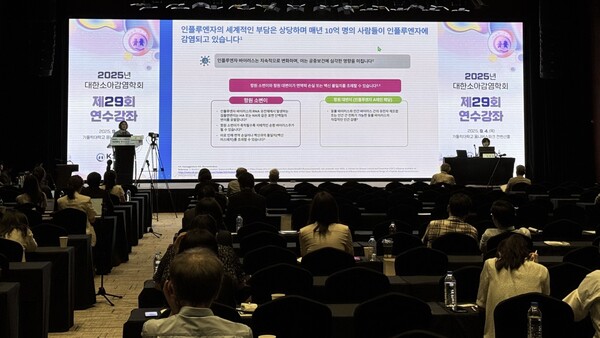FluMist, a nasal spray influenza vaccine, is drawing attention as a potential new turning point in pediatric influenza vaccination due to its ease of administration and excellent preventive efficacy.
AstraZeneca Korea hosted a symposium at the 29th Education Lecture of the Korean Society for Pediatric Infectious Disease on Wednesday.
Professor Lee Jin of the Department of Pediatrics at the Catholic University of Korea Incheon St. Mary's Hospital delivered a lecture titled “A Paradigm Shift in Flu Prevention: The Importance of Pediatric Vaccination for Achieving Herd Immunity.

Professor Lee explained the global burden caused by influenza, saying, “Specifically, a Finnish study targeting children during the 2001-2002 season found that younger children face a higher risk of otitis media, a complication associated with influenza. Furthermore, a U.S. study covering the 2010-2019 seasons revealed that two out of 10 children hospitalized for influenza required intensive care unit treatment.”
Lee further emphasized the importance of influenza vaccination in children, stating, “Research has confirmed that children play a significant role in influenza transmission and even influence increased morbidity and mortality rates among the elderly.”
He then introduced FluMist as a new option to enhance herd immunity against influenza in children. FluMist is a live attenuated influenza vaccine administered as a nasal spray, characterized by inducing an immune response within the nose that closely mimics natural immunity.
"The preventive efficacy of FluMist in children deserves particular attention. In a study of the 2004-2005 season, children under five years old in the attenuated live vaccine group had a 54.9 percent (95 percent CI 45.4-62.9) lower incidence of influenza disease compared to the inactivated vaccine group. In a 2004-2005 season study of children aged 24-59 months, the live attenuated vaccine group showed higher relative preventive efficacy than the inactivated vaccine group in both virus strain-matched and mismatched scenarios," Lee explained.
Professor Lee also emphasized the role of FluMist in achieving herd immunity for the entire community. “FluMist is expected to contribute to enhancing herd immunity by improving vaccination rates in children, thanks to its high preventive efficacy and the comfortable administration method of the nasal spray,” he said.
Professor Kim Yun-kyung, the symposium chair, stated, “Improving vaccination rates among children is paramount in preventing influenza spread within communities. FluMist is an innovative vaccine that enhances convenience through its non-invasive spray method while demonstrating excellent preventive efficacy in children. It is expected to mark a new turning point in pediatric influenza vaccination.”
AstraZeneca Korea Biopharmaceuticals Business Unit Director Kim Ji-young said, “FluMist will contribute to reducing the disease burden caused by influenza as a new alternative for pediatric influenza vaccination. We will continue our efforts to raise awareness about the importance of pediatric influenza vaccination and create an environment that enhances access to FluMist.”
FluMist Intranasal Spray received approval from the Ministry of Food and Drug Safety in April for the prevention of influenza disease caused by influenza A viruses and influenza B viruses contained in this vaccine, for children aged 24 months and older and adults up to 49 years of age.
Related articles
- AZ's FluMist returns to Korea as needle-free, kid-friendly flu vaccine
- 28 million doses of flu vaccine approved for national distribution this year
- AZ's needle-free, intranasal flu vaccine wins Korean approval
- Preterm and abnormal births rise as pediatric infrastructure declines
- AstraZeneca Korea, Seoul Bio Hub agree to boost global competitiveness of biotech startups

